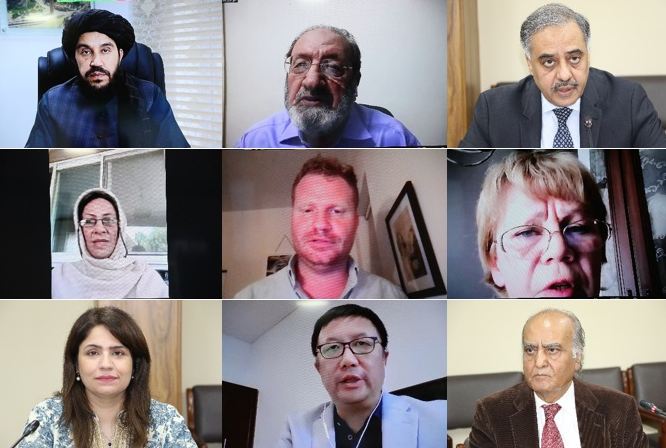ISSI holds webinar on “Interim Afghan Government in Power – Three Years on”

ISLAMABAD, AUG 15 /DNA/ – The Centre for Afghanistan Middle East and Africa (CAMEA) at the Institute of Strategic Studies Islamabad (ISSI) hosted a webinar, titled “Interim Afghan Government in Power – Three Years on.” The webinar was moderated by Ms. Amina Khan, Director CAMEA. Speakers included Ambassador Sohail Mahmood, Director General ISSI; Ambassador Khalid Mahmood, Chairman BoG, ISSI; Sardar Ahmad Shakeeb, Charge d’ Affaires/Minister Counselor, Afghanistan Embassy, Islamabad; Ambassador Ayaz Wazir, Former Pakistani Diplomat; Dr. Mandana Tishehyar, President of the Iranian Peace Studies Scientific Association; Dr. Ye Hailin, Director, Center for South Asia Studies, Chinese Academy of Social Sciences, Beijing; Dr. Zamaraeva Natalia Alekseevna, Senior Researcher Center for the Study of the Near and Middle East, Russia; Adam Weinstein, Deputy Director of the Middle East Program at the Quincy Institute for Responsible Statecraft, Washington D.C.
Ambassador Sohail Mahmood stated that while the Taliban have consolidated power over the past three years, significant concerns persist regarding their governance, respect for human rights and women’s rights, and counter-terrorism measures. He acknowledged positive developments such as improved security and certain economic indicators like increased revenue and exports, but noted that these were overshadowed by ongoing challenges in other domains. He mentioned that potent threats from groups like ISKP and TTP continue to challenge the Taliban’s authority and stoke regional tensions. These concerns were borne out by the UN report as well. It was important for the Interim Afghan authorities to address Pakistan’s specific concerns on this account in an effective, credible and sustainable manner. Ambassador Sohail Mahmood also highlighted the complexities of Pakistan-Afghanistan relations and emphasized the imperative of enhanced cooperation in diplomacy, trade and economy, and security and counter-terrorism to stabilize the region. While stressing that a peaceful, stable and prosperous Afghanistan was in Pakistan’s vital interest, he underlined the need for the Taliban authorities to take the long view and work with Pakistan to counter the threats and realize the opportunities for peace, stability, connectivity and prosperity.
Ms Amina Khan noted that the Taliban have solidified their status as the de facto political authority, though not de jure. They have established a fair degree of stability and security, along with efforts to stabilize the economy. In a significant diplomatic shift from the 1990s, the Taliban have been engaging in diverse regional and global interactions, including 18 active political missions internationally. However, she expressed concerns over ongoing human rights violations, particularly against women, and threats from transnational terrorist groups like ISKP and TTP. Ms. Khan emphasized the fundamental importance of the bilateral relationship that is crucial in shaping the future of the region.
Sardar Ahmad Shakeeb stated that the Interim Afghan government has maintained internal unity, restored political and security stability, and saved the economy from collapse through infrastructure projects. Efforts have also focused on eliminating corruption, combating narcotics, and reforming bureaucracies while creating a new, corruption-free army that has generated youth employment. Despite international sanctions, Afghanistan has seen increased exports, the opening of over 1,500 factories, and plans for modernizing customs and establishing export centers. Diplomatic relations have strengthened with 39 active embassies, and border security has improved. He stated that no country is without differences or disagreements with others, but these should be resolved through dialogue.
Ambassador Ayaz Wazir acknowledged the Taliban’s control in Afghanistan despite lacking formal recognition. He expressed concerns about governance issues, including girls’ education, human rights, and the need for inclusivity. Ambassador Wazir urged the international community to recognize the Taliban’s reality and engage with them to ensure regional peace.
Dr. Mandana Tishehyar observed that despite the Taliban’s claim of defeating the U.S., they face governance challenges, raising security concerns for neighbouring countries. Economic talks have progressed, but the Taliban’s lack of recognition was due to the abandonment of the constitution and unclear foreign policy. She emphasized the importance of the SCO and multilateral engagement through the Afghanistan Contact Group to address these challenges collectively.
Dr. Ye Hailin discussed China’s focus on Afghanistan which was based on non-interference, respect for Afghan sovereignty and social economic development. He said that Beijing’s engagement was not based on conditionalities, but rather engagement with the Taliban for the welfare of the masses. He outlined five principles guiding China’s policy in Afghanistan, self-governance, respect for sovereignty, global commitment to reconstruction, Afghanistan’s right to choose its government, and unconditional assistance.
While expressing her views, Dr. Zamaraeva Natalia Alekseevna stated that the best approach towards Afghanistan was through engagement with the Taliban. She said a common approach was required towards the group that would ensure the Taliban addressing regional concerns. She talked about the presence of transnational terrorist groups, particularly the TTP. She said that despite Pakistan’s repeated concerns regarding the TTP, the Afghan Taliban had failed to resolve the matter.
Adam Weinstein highlighted that since the Taliban took over Afghanistan, while violence has decreased, threats emanating from transnational terrorist groups such as ISKP and the TTP continue which are not just threats for the region but for the wider international community as well. He said that if an attack by the ISKP were to take place on continental Europe it would bring Afghanistan back to forefront of international focus. He said the Afghan Taliban were supporting terrorism and a low intensity war against Pakistan. Moreover, the targeting of Chinese workers in Baluchistan and now in Khyber Pakhtunkhwa is worrisome as is the transnational nature of the TTP and its links to terrorist groups.
These presentations were followed by a Q&A session. While concluding, Ambassador Khalid Mahmood acknowledged progress under the Taliban rule, noting improvements in security and economic realm. He also stressed the importance of addressing issues like refugee management and terrorist threats.
Related News

Ramadan moon sighted in Pakistan, fasting starts today
ISLAMABAD, FEB 19: Pakistan begins the first fast of Ramadan 2026 today (Thursday), following theRead More

PEACE BOARD MEET: PM Shehbaz to seek clarity on troops for Gaza in US visit
“We will not be part of any other role, such as disarming Hamas. It isRead More


Comments are Closed